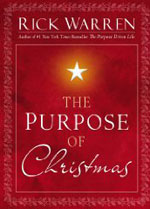 A few weeks ago I received an invitation from Beliefnet co-founder and editor-in-chief teve Waldman to make note of my “Best Spiritual Read of 2008.” One book clearly came to mind. It’s a pretty simple, straightforward book, though I’ve tried to remember a better or more challenging, more sublime, or more esoteric book to put forward.
A few weeks ago I received an invitation from Beliefnet co-founder and editor-in-chief teve Waldman to make note of my “Best Spiritual Read of 2008.” One book clearly came to mind. It’s a pretty simple, straightforward book, though I’ve tried to remember a better or more challenging, more sublime, or more esoteric book to put forward.
Alas, though, there’s no getting around it: the one that was the best, the most challenging, the most sublime, and certainly the most spiritually powerful was so profoundly simple that it was simply profound: “The Purpose of Christmas” by Rick Warren. The book has joined Handel’s “Messiah” and “A Charlie Brown Christmas” as the media that inspire me most at this time of the year outside of, of course, the Bible itself.
Consider the simple claim Warren starts with:
During the Christmas season, billions of people set aside their normal routines to decorate their homes, send out greeting cards, buy gifts, go to Christmas parties, attend church services, sing Christmas songs, watch Christmas TV specials, and travel long distances to be with their families. Christmas sights and sounds fill the air everywhere. There are stores, and even careers, that are exclusively dedicated to preparing for and celebrating this holiday. When Christmas comes, you can’t miss it. It’s everywhere.
Well, there’s no arguing that. Christmas is either the annual celebration of God come to earth, or it’s an annual tradition based on a myth. Christmas exists, but the question is: Does it exist as a valid celebration of the truth for which it stands? Or is it a nostalgic nod to an outdated religion of days gone by?
Warren goes on to point out three aspects for the purpose of Christmas that are woven throughout the biblical story and throughout out his book as well: celebration, salvation, and reconciliation.
The “celebration” part is a good challenge to consider. Why, he asks, don’t we celebrate the savior all year long? Yet Warren writes in a way that does alienate people who find time for Christ at Christmas but not throughout the rest of the year. He presents an invitation to consider a more purposeful and spiritually-driven life throughout the year.
“Salvation” isn’t a word that’s used a lot today, but it certainly separates what is supernatural from what is traditional about Christmas and Christians. All too often–especially in our political culture and in the media–Christianity is reduced to being portrayed as a system of political beliefs or a set of values or an agenda. In its essence, though, Christianity starts and ends in a supernatural and spiritual relationship with Jesus Christ that will continue in the next life. Those who don’t know that Jesus came for them personally are missing out on not only the meaning–but the power–of Christmas.
Finally, Warren writse about “reconciliation.” If the first commandment of Jesus was to “love the Lord with all of your heart, soul, mind, and strength,” the second is like it: “that you should love your neighbor as yourself.” These words, from Matthew 22, provide an exhortation to followers of Christ that should last all year long but be revisited at Christmastime. What if all Christians let the season pass without pursuing necessary reconciliation with family and friends?
Yes, “The Purpose of Christmas” was the best spiritual read of the year for me. A well-known literary agent once commented, “Rick Warren’s not necessarily a great writer, but his message sure seems to resonate.” His Christmas message resonated with me, and I hope some of its message helps me to be more faithful in the coming year.


